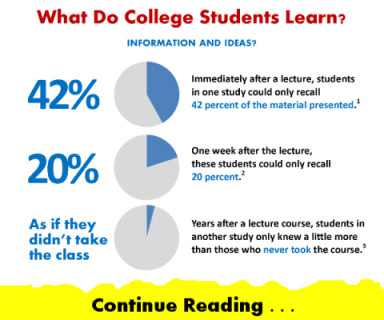This is my first contribution to the theme Governance and Education as brand-new curator of ASC
Close your eyes and imagine a large industrial site at the end of the 19th century. 1000's of labourers are sitting behind sewing machines.
Still keep your eyes closed and imagine a lecture hall, you see again rows and rows of students who hurry to copy the words of the teacher.
The resemblance is clear. The difference too: The industrial site is history; the lecture hall is present time.
The problem is that universities failed to adapt their educational methods to the massive growth of the number of students. As a consequence, the small classrooms of the past made room for the lecture halls of the present. The ability to deliver quality is under pressure.
Quality in higher education is connected with the realization of two major learning outcomes:
• Ability to apply and to discuss scientific knowledge, together with an awareness of inherent philosophical and epistemological issues.
• Competences to analyse, critically reflect, and solve real live-problems, deploying scientific methods.
The majority of contemporary universities are realizing these outcomes only partially. As far as universities are aware they blame government because of insufficient funding. I do not expect any substantial change in this respect. Besides, universities better economize themselves first.
Universities must face reality and improve the quality of their education and deal with a growing and ever more differentiated student population, while funding will remain about equal.
This challenge can be solved only by become smart, which means that universities have to innovate, in particular by deploying ICT.
Universities can economize by flipping their classrooms radically and supporting their students in choosing appropriate open educational resources. At this time, online content covers any part of scientific knowledge. The best scientists are involved in their development and educational technologists have designed the best visual support. Delivering feedback at student's assignments are the only expenses left.
Digital sources are able to contribute significantly to the active acquisition of knowledge, the first of the two yardsticks for quality in higher education of higher education.
But what about the second one: The competence to analyse, reflect and solve real live-problems deploying scientific methods.
This objective definitely goes beyond the capabilities of open educational resources.
The one way to develop this competency is engaging students in independent work, like writing theses and doing projects, preferably in collaboration with institutions outside the university. Projects might be executed in small groups and students learn to deal with real problems and their owners.
Of course students need expert teachers' supervision. After having reduced their activities with respect to knowledge transfer significantly, teachers will have sufficient time to act as project supervisors and most will love it.






Dear Otto, I fully agree. Fantastic examples at secondary school level are emerging. See my newest post
Hello Herman,
Not only universities! In my opinion the whole education system after primary school needs to 'flip' its methods.
At this moment most schools still function as if this was the 19th century. Being in the classroom is obligatory. Teachers are there to maintain order. Speed is adapted to the pace of the slower students. The curriculum is organised per year (why a year?) and if you’re bad at some subjects you have to do the whole year again. Students are often very bored and uninspired. Students don't have a say in the curriculum or in the teacher. And so forth. And I won't even touch upon the teachers who have long lost their drive, bad social phenomena like bullying etc.
I know not all schools are like this, and there are many truly gifted teachers, but in general I think the school system is totally obsolete.
Wouldn't it be great if students would be encouraged to gain knowledge by themselves, following their own interests, and at their own speed, assembling a body of knowledge that would be uniquely theirs, and totally compatible with their own talents?
And wouldn't it be nice if schools were places where the social side of learning is emphasized:
I don't think this would be very hard to realize. The technology is all out there. The content also. In a smart city, this should be worth a serious experiment!